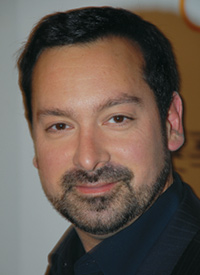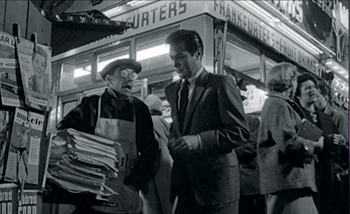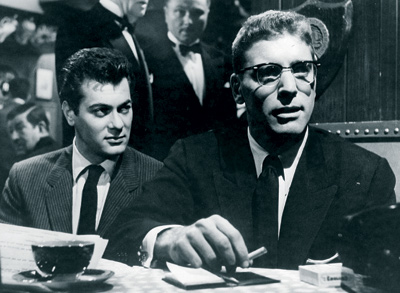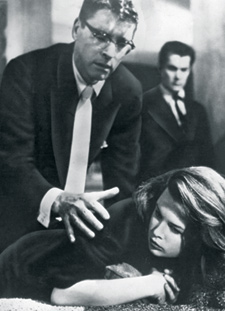BY ROBERT ABELE
 TEXTBOOK: James Mangold first saw
TEXTBOOK: James Mangold first saw
Sweet Smell of Success when he
studied with the film's director,
Alexander Mackendrick.New York-born James Mangold was all of 17 when, as a fresh-faced CalArts film student, he was introduced to Alexander Mackendrick as his appointed mentor. Not being familiar with the esteemed director's work at Britain's Ealing Studios, Mangold watched Mackendrick's first American film,
Sweet Smell of Success, the classic 1957 tale of corruptive big-city ambition. And with that, a fan was born.
"I was blown away by several things," says Mangold as he settles into the fluffy white couch in his Santa Monica office's screening room to watch it again. "Mainly that the language, the cinematography [by James Wong Howe], and the world, while real, had an incredible poetry to it, a kind of swing. At the same time it spoke about dark characters. It reminds me of when you study Shakespeare. No one is pure; everyone's after something."
Based on a novella by Ernest Lehman, whose screenplay was significantly rewritten by the blacklisted playwright Clifford Odets, Sweet Smell of Success takes place in Manhattan's make-or-break newspaper world, and covers roughly 36 hours in the life of Sidney Falco (Tony Curtis), a hustling, item-planting press agent. Falco's thirst for the big time leads him into a smear scheme with Winchell-esque columnist J.J. Hunsecker (Burt Lancaster), who not only enjoys controlling the lives he writes about but also his struggling-to-break-away kid sister Susie (Susan Harrison).
"The other part of this movie is its political side," says Mangold as the film opens with Elmer Bernstein's brassy, bluesy score and documentary-like shots of newspaper trucks delivering the early edition to a still-buzzing, late-hours metropolis. "The world was filled with these hugely powerful figures—Walter Winchell, Hedda Hopper—who were exercising tremendous influence, not only over what movies we saw, but over elected officials, how the government moved. This movie was an incredibly aggressive slap in the face to the entire entertainment business as it existed."
We meet Falco as he buys the first unbundled newspaper and squeezes into a crowded Times Square diner, suddenly deflating as he scans Hunsecker's column. "While this is a dialogue-filled movie, what we're watching right now is a silent film," says Mangold. "We don't know what he's upset about, but we're instantly hooked. Today you'd have a studio wondering, 'Why can't he explain what's going on?' All we know is he saw something, and he's deeply disturbed."
Falco tosses the paper and makes a beeline to his rinky-dink office/apartment, where we discover that he's been shut out of Hunsecker's column for five days, and his clients are upset. As he changes clothes in front of his mousy, eager-to-please secretary, whom he's clearly slept with, Falco says, "You think I'm a hero, well I'm no hero. I'm nice to people where it pays me to be nice."
Mangold zeroes in on why Curtis' performance, a daring change of pace for the then-matinee idol, is so galvanizing. "It's casting a natural Hollywood hero in this very dark role, in which his good looks and charm become something more interesting than a way to get the audience to love him. It really highlights the loneliness of a guy for whom it all comes so easy, yet life is still completely empty to him."
The action zings to a packed nightclub. From the side the camera captures Steve Dallas (Martin Milner) playing jazz guitar onstage, then moves forward past him to emphasize the crowd, before cutting to a close-up of Falco watching from the back. He's desperately trying to find out if Dallas and Hunsecker's sister are still an item. Hunsecker is obsessed with breaking up the couple and if Falco is going to "climb the ladder to the places I want to get," he's got to help Hunsecker.
"There's a claustrophobia to the film," Mangold says of these nightlife scenes. "You watch Tony Curtis' eyes. One of the ways the director does more than just making a recorded version of the dialogue is that he's showing Curtis always operating on two levels: the facile level everyone talks on, and the level of sizing up the situation. He's like a gunfighter, every club becomes a room he's scanning. Who's here, who's not here."
Falco gets his answer when he finds the lovers out back, and after a minor dust-up with Dallas he escorts the melancholy Susie back home. "You feel she's truly a beaten dog," says Mangold of Harrison's performance. "She reminds me of Judy Garland a bit, the pain she brought [to a role]."
 NEW YORK, NEW YORK: For Mackendrick, it wasn't a wonderful toen. In the
NEW YORK, NEW YORK: For Mackendrick, it wasn't a wonderful toen. In the
opening scene, Falco buys an early edition to check Hunsecker's column.
As the cab pulls up to Susie's apartment building, we get a vivid shot of the real Times Square, one of the Howe's many exterior shots of glittering night in Manhattan. "They're standing in the door of the Brill Building," notes Mangold. Falco jumps back in the cab, as Mangold mentions how important location shooting became during this era. "It's still the world of Automats and great movie theaters and Broadway, but what Howe does with these exteriors, it's the dark sparkle of the city. It isn't the Breakfast at Tiffany's world."
Next stop for Falco is the hot spot the 21 Club. Hunsecker is there with a senator, an agent and "a thing of blonde wavy hair." Finally, Mangold says excitedly, "We're about to meet J.J., but Mackendrick pulls this incredible game. We see in a long shot the back of Lancaster's head, but does Sidney go talk to him? No." Instead, Falco darts around to a bank of phones to call Hunsecker's table, where we now hear Lancaster's cool, calm voice telling Falco to go away. "It's one more striptease, one more indirect moment in which he calls a guy who's 20 feet away," says Mangold. "You've been watching people talk about a guy named J.J. for an audacious amount of time without him arriving. It almost breaks every rule of show first then tell. The director is doing such a unique dance with star power."
Unbowed, Sidney brazenly goes to Hunsecker's table and asks for two minutes of his time. Now we see Lancaster, the camera at table height, and he looks both serene and severe. "Howe lit Lancaster with very top lighting, so his face appeared like a skull," explains Mangold. "And his eyes would go counter to the kind of Hollywood glamour style. The three people opposite him are all nicely lit from the front, and Tony has his own light, illuminating his face. But Lancaster, he's completely riddled with lines and shadows."
Hunsecker allows Falco to sit just behind him, and after commenting on his professional sliminess, takes out a cigarette and utters the famous demeaning line, "Match me, Sidney." But Mangold gets animated over the seemingly throwaway moment afterwards as an agent hesitatingly approaching the table and is quickly dismissed by Hunsecker before he can say anything. "It's another thing I learned from Sandy [Mackendrick], how to use bit players to create a reality," says Mangold. "It creates a sense that the world is not a vacuum, that this table is ground zero of power. Every bit of staging has people stopping, genuflecting, kissing the ring, or like Sidney, sitting a little behind like he isn't worthy."
Outside, Hunsecker runs into a brutish cop who is one of his informants. As the pair talk in the foreground facing each other, Mackendrick places Falco between them in the background, a silent third element. "That's not accidental," Mangold says. "When you have a guy like Tony Curtis and you can reduce him to being an extra in a scene between a day player and Lancaster, you've done something powerful. Suddenly the scene is triangulating.
"I thought of it in 3:10 to Yuma," he adds. "When Russell Crowe is sitting and sketching in a bible and does not say a word while Christian Bale says goodbye to his son, the weird energy of a dark gunman sitting between them suddenly makes the scene not a cliché. The frame becomes active."
Granted a second chance by Hunsecker to do his bidding, Falco heads to another nightspot. "He's got to get a rival columnist to plant something in J.J.'s interest," explains Mangold. Falco sidles up to his target sitting with his wife and slips him a folded piece of paper, the contents of which we can only guess are about Susie's boyfriend. "All you have to know is that it burns; it's power in there." But when Falco tries to blackmail the columnist with some salacious material about his love life, it backfires and the writer bristles at Falco's seaminess. Says Mangold, "What I love here is even though these are characters who don't figure in the story, the camera moves in and creates an actual romantic, intimate, unexpected moment. A guy admits an affair to his wife under pressure. What's profound are these little epiphanies, the sense of idealism in this island of lost souls."
Striking out there, Falco finds another sleazy columnist, and in exchange for an item planted in his paper, Falco pimps out a cigarette girl who is waiting for him back in his office. The disturbing scene of Falco convincing the girl to go off with this strange guy is a master class in shot selection, says Mangold. "It's the kind of scene a director doesn't get credit for, this kind of tête-à-tête. But it's a dance, he's playing all sides of her. If we counted the setups from the moment Falco brought them in, it's virtuosic. The scene looks simple. No horses, children, animals, explosions. But finding where the camera needs to be in relation to these faces so you're pushing past the dialogue into something psychological behind the eyes, requires being in the right place."
 TWO OF A KIND: Burt Lancaster as J.J. Hunsecker was lit with very top lighting
TWO OF A KIND: Burt Lancaster as J.J. Hunsecker was lit with very top lighting
by the great James Wong Howe so his face appeared like a skull. Holding a
cigarette, he's aboutto utter one of the films' most famous putdowns to
press agent Sidney Falco (Tony Curtis), "Match me, Sidney."
The next morning, Hunsecker is worried the smear will get traced back to him. He dominates the screen in his penthouse apartment, then Mackendrick cuts to a long shot of Susie—diminished by distance—timidly entering the front door and running to her room to avoid her brother. "The way she guns for the door, it's nothing but it's everything," says Mangold. "The easiest way to stage this scene is to have someone march to the place where what happens happens. But the way life works is people always go somewhere else, avoid conflict, eye contact, or have some piece of business. Sandy taught me that every character has an agenda. Not even a waif like Susie enters a room without going, 'What happens when I walk in and he's there?'"
Later at the Broadway theater where Hunsecker shoots his television show, he brushes off a fawning old lady and heads to a dimly lit backstage corner to strategize with Falco. Notes Mangold, "A conventional filmmaker would have started here, two men whispering, but again, there's Falco waiting while the day player does a bit, and then he gets drawn into the darkness."
Although he knows the film by heart, Mangold is caught up in both the storytelling and the filmmaking. In the next scene, a Falco-staged bit of détente between Hunsecker and Dallas, he admires how Mackendrick moves the characters around. As they talk, Falco is a gliding head in the background, like a director observing actors. "It's fantastic, how he moves, finds another little mark," says Mangold, as Falco disappears stage left. "He exits the frame—fantastic! I'm sure Sandy had a reason. Let's see where he finds him."
Sure enough, Hunsecker separates from the group to the left and the camera follows—"Ah, a pan," Mangold mutters—and there's Falco, by himself, now positioned behind Hunsecker like the power behind the throne. As planned, Dallas blows up and Hunsecker has his public reason to banish him. "It's what I spend most of my time trying to get better and better at," says Mangold. "The balance in these multi-character master shots that are moving all the time is amazing."
The scene ends with Hunsecker kissing his demoralized sister on the cheek, his obsession with her purity now physically manifest. "It's just completely unnerving," says Mangold, shaking his head.
After Falco arranges one last ugly errand—the boyfriend's ignominious arrest—he gets word that the big man wants to see him at his penthouse. "And now the unfolding of the narrative," says Mangold with relish. Falco gets there in time to grab a half-undressed Susie before she tries to commit suicide by hurling herself off her bedroom balcony. After depositing her on the bed, an incredible shot follows Falco opening her bedroom door, but instead of leaving, the camera pans left as he shuts and locks the balcony door, then pans back again, allowing Falco to exit right, and at that moment the shot stops to reveal Hunsecker just outside the bedroom door.
"Isn't that great?" declares Mangold. "The blocking, swinging the camera with Sidney, letting him exit. There was a tremendous amount of conflict with Burt Lancaster and others over how this film resolved itself. But Sandy said he shot it in such a complicated fashion, so many setups, and the eyelines crisscrossing, that there was only one way to put it together."
 A HELPING HAND: Mackendrick like to set up triangular
A HELPING HAND: Mackendrick like to set up triangular
shots like this one with Falco in the background observing
the power struggle between Hunsecker and his sister.
And now as it becomes clear that it was Susie who engineered her faux protectors being there at the same time—and turning on each other—Mackendrick's coup de grâce is a final triangulation shot with Falco groveling, Hunsecker seething, and Susie in the middle. "Now who's between them listening?" marvels Mangold. "How this waif suddenly becomes incredibly powerful is chilling."
Falco vocalizes it in a tart aside to Susie after Hunsecker slaps him around: "You're growing up. Cute." Mangold is thrilled. "I love that line."
The film ends with Susie walking out on her shattered brother. "I'd rather be dead than living with you," she says as she exits into the New York dawn alone. "That's the first time we've really seen day," adds Mangold. "For a movie that's ultimately about power and who's holding it, look what these frames tell us. For this subordinate character, it's a very triumphant ending. She beat them."
For Mangold, his mentor's masterpiece is the ultimate battery recharger. "It's an absolutely tireless source of lessons in how to do the job and tell a story. There are no huge gun battles, no chase sequences, yet it is electric, it's alive, and the dialogue dances with a very cinematic style, as opposed to holding it down and making it theatrical. I think it's one of the great American movies."